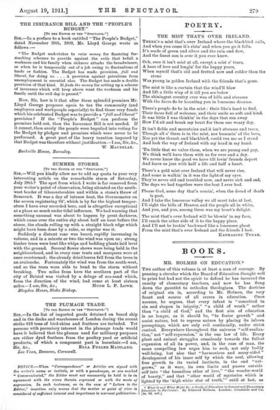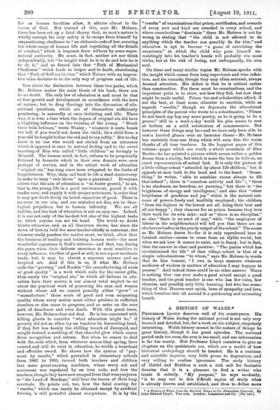BOOKS.
MR. HOLMES ON EDUCATION.*
THE author of this volume is at least a man of courage. By penning a circular which the Board of Education thought well to print but had not the spirit to defend he has incurred the enmity of elementary teachers, and now he has flung down the gauntlet to orthodox theologians. The doctrine of original sin is, according to Mr. Holmes, the very fount and source of all errors in education. Once assume, he argues, that every infant is " conceived in sin and shapen in iniquity," "a child of wrath" rather than " a child of God," and the first aim of education is no longer, as it should be, "to foster growth" and assist nature, but to repress nature by placing its inborn promptings, which are only evil continually, under strict control. Everywhere throughout the universe "self-realiza- tion," not " self-repression," is the one law of life. Every plant and animal struggles ceaselessly towards the fullest expansion of all its power, and, in the case of man, the same compelling law urges him to seek, not only bodily well-being, but also that "harmonious and many-sided " development of his inner self by which the soul, allowing free growth to its varied instincts, in the end "out- grows," as it were, its own limits and passes outside self into "the boundless ether of love," "the wonder-world of beauty," and that " other world of mysteries which is lighted by the 'high white star of truth,'" until at last, as • What Is and What Might Be : a Study of Education in General and Elementary Education in Particular. By Edmond Holmes. London; Constable and Co. [4s. 6d. net.]
far as human faculties allow, it attains almost to the vision of God. But instead of this, says Mr. Holmes, there has been set up a fatal theory that, as man's nature is wholly corrupt, his only safety is to escape from himself by unquestioning obedience to " an elaborate code of law, covering the whole range of human life and regulating all the details of conduct," which is imposed from without by some super- natural authority. He must, in fact, neither act nor think independently, but " be taught what he is to do and how he is to do it," and so forced into that "Path of Mechanical Obedience " which leads to torpor and to death, abandoning that "Path of Self-realiz Ilion" which Nature with an impera- tive voice declares to be the only way of progress and of life.
Now about the distinction between these two paths, which Mr. Holmes makes the main thesis of his book, there can be no doubt. The only law of education is and must be that of free growth and development in accordance with the laws of nature ; but to drag theology into the discussion of edu- cational questions, which are of themselves sufficiently perplexing, is assuredly at once irritating and idle. There -was, it is true, a time when the dogma of original sin did have a blighting influence on the training of the young. " Break their wills betimes," wrote Wesley ; "whatever it costs, break the will if you would not damn the child; let a child from a year old be taught to fear the rod and to cry softly." But to-day there is no one who would not shrink from an utterance which is opposed at once to natural feeling and to the sweet teaching of Him who called "little children" so lovingly to Himself. The human mind, in fact, refuses to be perpetually fettered by formula; which in their own domain were once perhaps of service, and in the actual work of education " original sin " has long since been relegated to the limbo of forgetfulness. Why, then, call back to life a dead controversy in order to heap " vain blows " upon a phantom P Everyone allows that the aim of education is "to foster growth," to set, that is, the young life in a good environment, guard it with tender care, and supply it with proper nutriment, in order that it may put forth freely its latent capacities of good. There is no error in our aim, and our mistakes are due, not to theo- logical prejudices, but to human infirmity. We are all fallible, and the task of education is not an easy one. Indeed, it is one not only of the hardest but also of the highest tasks to which anyone can set his hand. The world no doubt thinks otherwise, and, as all literature shows, has since the dawn of history held the mere teacher chiefly in contempt; but whoever really ponders the matter must, we think, allow that the business of tending and training human souls—the most wonderful organisms in God's universe—and that, too, during the years when their delicate structure is most sensitive to every influence, whether of good or evil, is not a poor mechanic trade, but, it may be, almost a supreme science and an inspired art. And if this is so, if what Mr. Holmes calls the " growing " and Ruskin " the manufacturing of souls of good quality " is a work which calls for the rarest gifts, then surely the "original sin," in which all failures in edu- cation have their source, is our almost total neglect to set about the practical work of procuring the men and women without whose aid we cannot possibly either "grow" cr "manufacture" those souls of good and even surpassing quality whom every nation must either produce in sufficient numbers or else cease to progress, and so enter on the sure path of decadence and even death. With this great issue, however, Mr. Holmes does not deal. He is too concerned with killing ghosts to consider "what education might be," if poverty did not so often lay on teachers its benumbing hand, if they felt less keenly the chilling breath of disregard, and caught instead something of that cheerful glow which comes from recognition and esteem. But when he comes to deal with the evils which, from whatever source they spring, have existed and still do exist in education, he wields a trenchant and effective sword. He shows bow the system of "pay- ment by results," which prevailed in elementary schools from 1862 to 1895, turned both teachers and children into mere grant-earning machines, whose every act and movement was regulated by an iron code, and how the teachers, though they have now escaped from that weary sojourn in " the Land of Bondage," still bear the traces of their long servitude. He points out, too, how the fatal craving for "results," which can rarely be obtained except by artificial forcing, is still powerful almost everywhere. It is by the
" results" of examinations that prizes, certificates, and rewards of every sort and kind are awarded in every school, and where examinations " dominate " there Mr. Holmes is not far wrong in stating that " the child is not allowed to do anything which the teacher can possibly do for him," and education is apt to become " a game of outwitting the examiners," in which the child who puts himself un- resistingly into his teacher's hands will probably win most tricks, but at the risk of losing, not =frequently, his own soul.
On these and many similar topics Mr. Holmes speaks with the insight which comes from long experience and wise reflec- tion, and his remarks, though they may often astonish, always demand attention. His defect is that he is critical rather than constructive. For there must be examinations, and the important point is to show, not how they fail, but how they might be made useful. Prizes too and scholarships afford, if not the best, at least some stimulus to exertion, while as regards "results," though we deprecate the educational principles of the parent who wrote to a schoolmaster, " Please do not teach my boy any more poetry, as he is going to be a. grocer," still in a work-a-day world his plea seems to rest at bottom on a solid substratum of commonsense. But however these things may be—and we have only been able to cast a hurried glance over an immense theme—Mr. Holmes has certainly done one thing which will earn him the warm thanks of all true teachers. In the happiest pages of this volume—pages which are worth a whole mountain of Blue Books—he has painted a picture which seems rather a golden dream than a reality, but which is none the less, he tells us, an exact representation of actual fact. It is only the picture of a little village school " attended by about 120 children," but it appeals at once both to the head and to the heart. " Some- thing," he writes, "akin to sunshine seems always to fill that school"; there is " ceaseless activity and life " ; " there is no slackness, no boredom, no yawning," but there is "the brightness of energy and intelligence," and also that "other brightness of goodness and joy " which is the natural out- come of powers freely and healthily employed ; the children " from the highest to the lowest are all doing their best and all are happy " ; they clamour for no prizes because they love their work for its own sake; and as "there is no discipline," so also " there is no need of any," while " the employers of labour in the neighbourhood will tell you that there are no slackers or loafers in the yearly output of the schooL" The scene as Mr. Holmes draws it—for it is only reproduced here in faintest outline—seems to come from an idyllic world; but when we ask how it comes to exist, not in fancy, but in fact, then the answer is clear and positive : " The genius which has revolutionized the life " of that village school is that of a. simple schoolmistress "to whom," says Mr. Holmes in words that do him honour, " I owe in large measure whatever modicum of wisdom in matters of education I may happen to possess." And indeed there could be no other answer. There is nothing that can ever make a good school except a good teacher, and the good teacher is one who has few rules, few theories, and possibly only little learning, but who has some- thing of that Heaven-sent spirit, born of sympathy and love, which breathes into all around it a quickening and animating breath.



































 Previous page
Previous page